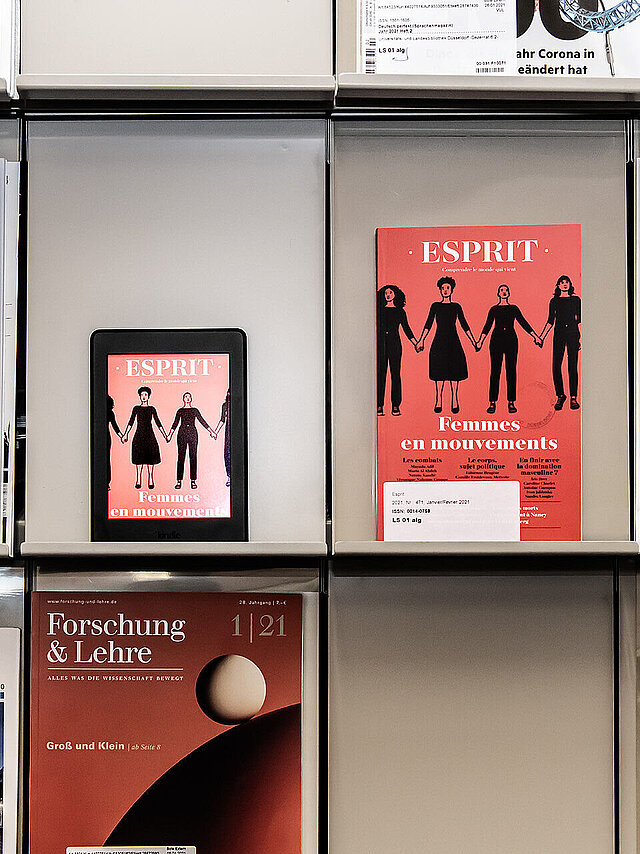ULB Düsseldorf offers online access to licensed e-journals and those freely accessible on the web via the Electronic Journals Library (EZB). This uniform interface, for example, enables an overview of the e-journals available for your subject or new acquisitions.
E-journals
ULB Düsseldorf caters to your digital literature needs with a diverse range of electronic media. Access the e-journals in the ULB catalogue, where you can also search many of the articles directly.
See below for an alternative search route and for details of further e-journal services.
Alerting services – always well informed
Keep up to date on the contents of new journals via email or RSS feeds.
JournalTOCs Premium, the alerting service licensed by ULB Düsseldorf, informs you free of charge via email of the tables of contents of the latest issues of countless journals. Choose from a wide range of international and German journals that you wish to be kept informed of. You can also be notified as soon as a new article is published on topics of your choosing.
Only HHU members and affiliates are able to use JournalTOCs Premium. Please note that you’ll need to register with a foreign service provider for this using your university email address.
Sign up now to use JournalTOCs Premium:
You can get certain publishers to email you the latest tables of contents for the journals that interest you.
Many publishers of scientific journals also offer the option of subscribing to tables of contents as RSS feeds on their websites. Whether a website offers such dynamic content can be recognized by the RSS logos on the website or the RSS icon in the browser.
Terms of use and licensing conditions
For licensing reasons, most e-journals can only be accessed by HHU members and affiliates. All other ULB library card holders are only able to access the e-journals at the computer terminals in the library.
According to the applicable copyright laws and ULB Düsseldorf’s licensing agreements, in most cases the contents of e-journals may not be downloaded or printed out in whole or in large parts.
You must adhere to the terms of use of the respective provider when using the e-journals offered by ULB Düsseldorf.
The following regulations generally apply:
The aforementioned authorised patrons are permitted to use the data for their own academic purposes within the framework of the individual providers’ licensing conditions. Only they may:
- search the e-journals offered;
- view search results (including full text articles) on their computer screen;
- save individual search results (including full text articles) locally for their own academic purposes;
- print out individual search results (including full text articles) as a paper copy in one copy for their own academic purposes.
Basically forbidden is:
- any use beyond the licensing conditions of the individual providers;
- any use beyond the patrons’ own academic purposes. In particular, use for commercial purposes is prohibited;
- systematic or multiple saving (in particular by bots), printing and/or archiving of the data provided.
Consequently, it is for example prohibited to:
save, print and/or archive entire journal issues.
It is moreover prohibited to:
- pass on licensed material to third parties who are not authorised patrons;
- rent or sell data;
- store the data on the patron’s servers;
- modify the licensed materials;
- produce derivative works.


